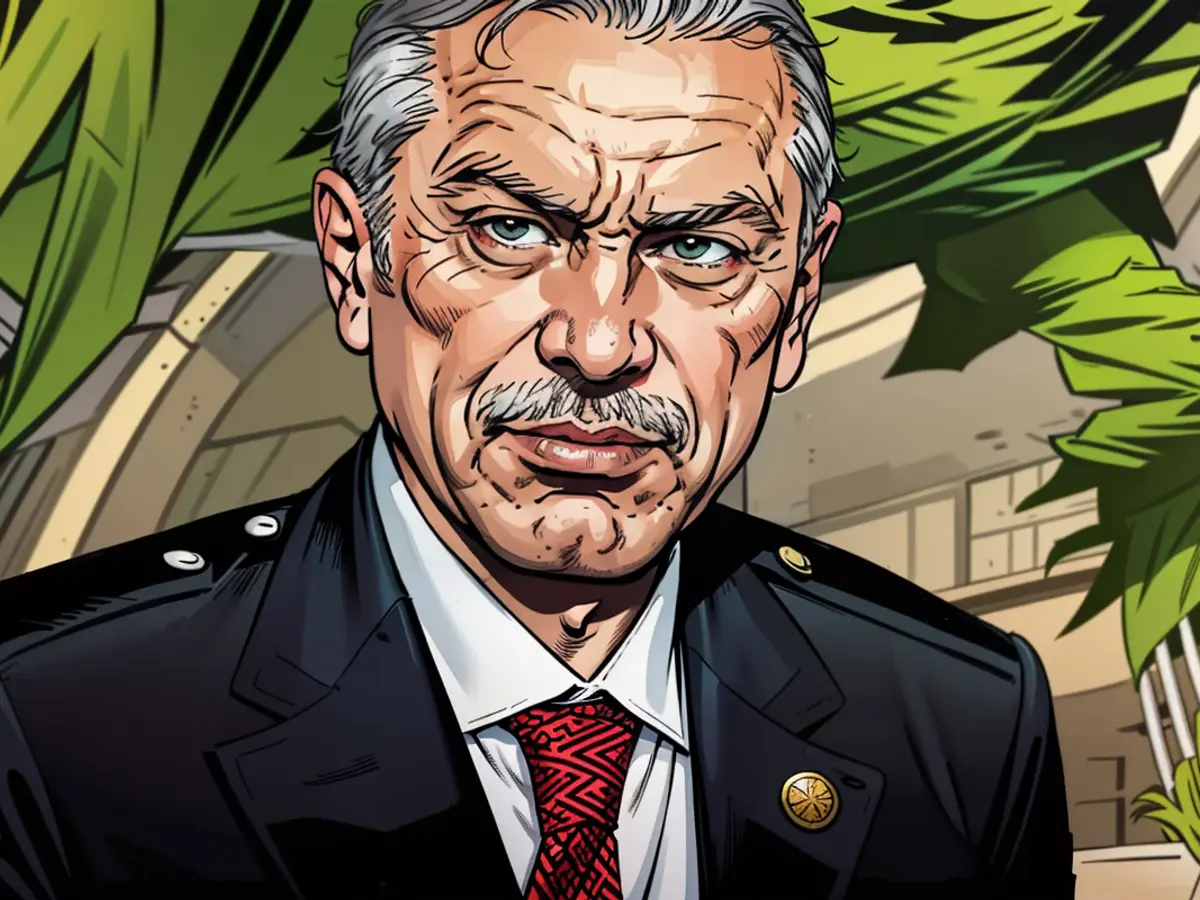European Football Championship - Wolf salute debate: Erdogan travels to Berlin
After sharp criticism of Merih Demiral's Wolfsgruß celebration by the Turkish football national player during the Wolves' jubilee in Berlin's EM quarterfinal against the Netherlands, the game becomes a political stage. Turkish President Recep Tayyip Erdogan is reportedly flying to Berlin short-term for the match on Saturday. He cancelled his planned trip to Azerbaijan, according to informed sources from the German Press Agency (dpa). This is also a response to the debate in Germany. Both countries have recalled their respective ambassadors.
"We addressed the incident today with the Turkish ambassador in Berlin," a spokesperson for the Foreign Office told dpa on inquiry. The German ambassador in Turkey was summoned on Wednesday. The summoning of an ambassador is considered a sharp diplomatic measure. Previous reactions from the politics of both countries had been clear.
Criticism from the Kurdish Community Germany
In Turkish media, it was reported that Erdogan wanted to strengthen the back of the Turkish team with his visit. The chairman of the Kurdish Community in Germany, Ali Ertan Toprak, urged the German government through the Redaktionsnetzwerk Deutschland not to "roll out the red carpet" for Erdogan. The visit to the game at the Olympiastadion (21.00 hours/RTL and MagentaTV) is expected to attract thousands of Turkish fans.
Demiral celebrated his second goal in the victory against Austria in the round of 16 in Leipzig on Tuesday with the gesture, whose origin is attributed to a right-wing extremist movement. Among others, German Interior Minister Nancy Faeser sharply criticized this. The SPD politician said: "The symbols of Turkish right-wing extremists have no place in our stadiums." UEFA is investigating the matter, and Demiral faces a ban.
Debate over the ban of "Grey Wolves"
The Turkish Foreign Ministry described the UEFA investigation as unacceptable. Not every person who shows the sign of the "Grey Wolves" can be labeled as right-wing extremist, it was stated. The Wolfsgruß is not banned in Germany - and the reactions of German authorities are "xenophobic."
The Wolfsgruß symbolizes in general the sense of belonging or sympathy with the Turkish ultra-nationalist ULKÜCÜ-Movement and its ideology. In Turkey, it is used by the ultranationalist party MHP, which is a partner of Erdogan's government. In the context of an increasing nationalism, recently even representatives of the political center have used the sign to appeal to voters from nationalist milieus.
An example is the former Erdogan challenger and Middle-Left-Politician Kemal Kilicdaroglu in the presidential election campaign 2023. In Germany, the ULKÜCÜ-Movement is monitored by the Constitutional Protection Agency. Demiral had said that he wanted to express with the gesture only that he was proud to be Turkish and that there was no hidden message behind it.
In Germany, the parties Alliance for Germany and The Left demanded a ban on the "Grey Wolves". In many EU countries, the "Grey Wolves" have rightfully been banned. "The Federal Government looks away and refuses to acknowledge the problem," said Katina Schubert, the business manager of The Left, to the "Tagesspiegel". Sevim Dagdelen, the foreign policy spokesperson of the BSW-group in the Bundestag, said: "Interior Minister Faeser and the Traffic Light coalition should not just lament, but finally act and ban the Grey Wolves along with the Wolf's salute, as our motion calls for."
- The EM quarterfinal match between Germany and Turkey in Berlin became a focal point of politics due to Merih Demiral's Wolfsgruß celebration, which drew criticism from various parties.
- Recep Tayyip Erdogan, the Turkish President, is reportedly planning to attend the game on Saturday in Berlin, having cancelled a trip to Azerbaijan.
- The German Foreign Office spoke with the Turkish ambassador in Berlin regarding the incident, with the German ambassador summoned to Turkey on Wednesday.
- In response to the controversy, the Kurdish Community Germany urged the German government not to provide a "red carpet" welcome for Erdogan.
- Demiral's celebration involved a gesture attributed to a right-wing extremist movement, which German Interior Minister Nancy Faeser criticized, stating that such symbols have no place in German stadiums.
- The UEFA is currently investigating the incident, with Demiral potentially facing a ban from future matches, according to reports.
- The Turkish Foreign Ministry described UEFA's investigation as unacceptable, arguing that not everyone displaying the Wolfsgruß sign should be labeled as a right-wing extremist.
- In Germany, political parties like The Left and Alliance for Germany have called for a ban on the Grey Wolves, an ultra-nationalist movement, which has faced scrutiny in many EU countries.
- The debate surrounding the ban of the 'Grey Wolves' and their symbol, the Wolfsgruß, has gained traction in both Germany and Europe in the context of increasing nationalism.







